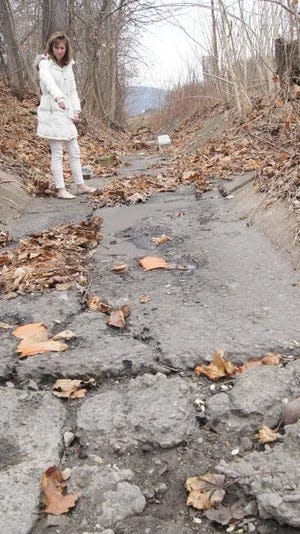Knowlton and Warren County to fund water filtration for Columbia residents
KNOWLTON — After decades of carrying home bottled water to drink and other problems with having a salty water supply, residents in Columbia hamlet could see a solution as the new year dawns.
Warren County commissioners recently approved a grant of more than $277,000 to provide osmosis water filtration systems for the 24 residences whose wells were poisoned by salt spread on the maze of highways and ramps which worked its way into the ground water.
The county and Knowlton Township are sharing the $554,592 cost to install the systems in the residences. The Township Committee earlier approved its half. Both governments are using money from COVID-related federal programs which they received earlier in the year.
While the town and county are chipping in, former Knowlton Mayor Adele Starrs says the New Jersey Department of Transportation and the Delaware River Joint Toll Bridge Commission (which owns much of the roads and ramps which nearly surround the hamlet) have not conceded their road salt is also to blame for the contamination.
Starrs, who ended nine years of service on the township committee at the end of 2022 had fought for years to get the state to admit oversalting of Interstate 80 and its ramps, along with state routes 94 and 46, contributed to the vast amount of salt which has turned up in the groundwater.

More:Volunteers sought to test salt levels in Paulins Kill watershed
Water and fracking:What the Delaware River Basin Commission bans, allows under new rules
Starrs also alleged the lack of maintenance on state-owned drainage ditches allowed even more contaminated road water runoff to flow through the broken concrete and directly into the ground.
A tort claim has been filed on behalf of the homeowners against the state and bridge commission.
That claim citing environmental damage was filed a dozen years ago, but has remained idle for the past couple of years. As part of the agreement to have the filter systems installed, homeowners signed waivers to not hold the township or county liable for future claims under that tort claim.
The town hit on the separate water filtration systems for the homes because there has never been a community-wide water supply and building a new one or hooking up to another municipal water system were cost prohibitive. New Jersey has different water supply standards than Pennsylvania, so bringing water across from Portland was ruled out. The next nearest system is more than 20 miles away.
The New Jersey Department of Environmental Protection installed monitoring wells in the area which have confirmed the increasing levels of salt in ground water, along with trace elements of heavy metals which scientists and researchers trace to traffic exhaust which settles on surround ground and also seep into groundwater.
The DEP produced a report on Columbia's private wells and traced the source of the sodium in the groundwater to the maze of highway ramps supporting the intersections of Interstate 80 and state highways 46 and 94; the Portland, Pa., toll bridge across the Delaware River; Warren County highways that serve the area; and township roads within the hamlet.
The DEP tested 40 wells in 2015 and produced maps which showed the level of sodium in the water. None of the wells tested less than 125 milligrams per liter. While there are no federal standards, people with some health conditions are cautioned against drinking water with more than 20 mg/L sodium content.
Several major studies have been done which show that the chloride left over from the snow/ice melt process can "kill" most life in ponds. The Cary Institute (caryinstitute.org) has published a study demonstrating how road salt enters and stays in the environment tainting groundwater, salting up streams and creating dead, salt-laden zones in lakes.
Related:Road salt taints wells in Knowlton's Columbia hamlet
Of interest:Warming Delaware River could threaten trout. What it means for anglers and tourists
Knowlton and Warren County contracted with Portasoft to install reverse-osmosis filtration systems in each of the 24 residences in the hamlet. Once the units are installed, the town and county will pay for service of the units for two years and filters for up to five years, said Mayor Starrs. Homeowners will then be responsible for future maintenance costs. Unit purchase and installation costs figure out to be about $23,000 per home.
"Just as important," she said, "they can now sell their homes if they wish." Because of the sodium contamination, property owners in Columbia saw the market value of their homes drop quite a bit.
Residents of the hamlet have claimed that bridge commission salt trucks don't turn off the salt spreading mechanisms when they leave bridge ramps and travel over other roads to get to other ramps, double-salting roadways. One homeowner provided the New Jersey Herald with a log of times during and after a storm when commission trucks passed her home, taking a short-cut between ramps, with the salt-spreading mechanism still running.
Reverse osmosis uses membrane-technology filtration to remove many types of large molecules and ions from the water supply by applying pressure to the solution when it is on one side of the membrane filter. The salt and other minerals are retained in the system while the water passes into the home's distribution system.
In addition to the filters, Knowlton has rebuilt its salt storage facility, a possible source of contamination, located just off Route 94 on hillside which slopes toward the river. The state Department of Transportation salt-storage facility is just west of the hamlet on Simpson Road.
This article originally appeared on New Jersey Herald: County to fund water filtration for Columbia, NJ residents
